In an era where information is a crucial asset, a Custom AI Knowledge Base is redefining how businesses manage and retrieve data.
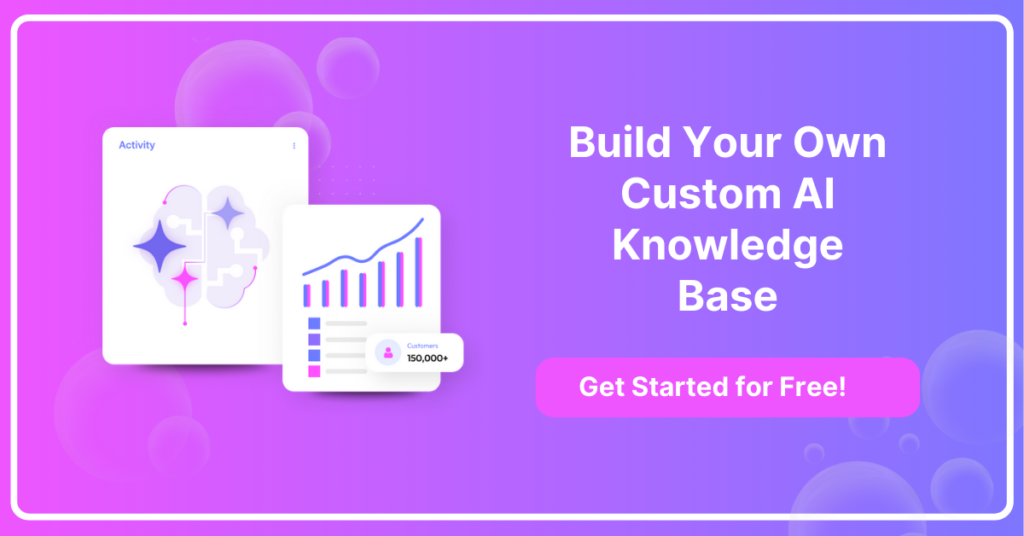
These intelligent systems leverage advanced technologies such as natural language processing (NLP) and machine learning (ML) to deliver fast, relevant, and context-aware insights.
By understanding user intent and continuously evolving based on real-time interactions, an AI Knowledge Base enables businesses to improve efficiency and enhance decision-making.
Unlike the old-school static databases, these smart systems use AI technologies like NLP and machine learning to give you fast, accurate, and context-aware insights.
They don’t just retrieve information; they understand what you’re asking, adapt to your needs, and keep learning over time.
That’s why companies across customer service, healthcare, finance, and e-commerce are making the switch. But here’s the catch—your AI-powered knowledge base is only as good as the data it learns from.
The better the data quality and system integration, the better the results. Let’s dive into the tech behind AI knowledge bases and how they work.
Defining AI Knowledge Bases
If you’ve ever asked a chatbot a question and got a vague or irrelevant answer, you know how frustrating that can be. AI knowledge bases fix that by using contextual understanding to turn raw data into actionable intelligence.
AI knowledge bases transform unstructured data into actionable intelligence through contextual understanding. Unlike traditional systems, these platforms leverage semantic search algorithms to interpret user intent, even with vague queries.
A generative AI knowledge base enhances this process by not only retrieving relevant information but also generating context-aware responses based on real-time data.
Natural language processing (NLP) enables these systems to analyze syntax, semantics, and context simultaneously. Unlike simple keyword matching, semantic search identifies relationships between terms, ensuring relevant results.
Core Components and Functionality
Dynamic indexing ensures real-time updates to the knowledge structure, seamlessly integrating new data as it becomes available. Dynamic systems leverage machine learning to reorganize and prioritize information based on usage patterns.
This approach enhances data accessibility and relevance, allowing businesses to adapt quickly to changing demands. For instance, a retail platform might automatically highlight seasonal products during peak shopping periods to optimize visibility and customer engagement.
However, the effectiveness of dynamic indexing depends on robust preprocessing; poorly structured data can lead to indexing errors, reducing reliability and efficiency.
- Real-time adaptability – Automatically updates the knowledge structure without manual intervention.
- Machine learning-driven reorganization – Prioritizes data based on user behavior and emerging trends.
- Scalability – Efficiently handles growing data volumes while maintaining fast retrieval speeds.
- Use case example – Retail platforms dynamically adjusting product visibility based on seasonality and demand.
- Dependency on preprocessing – Requires well-structured data to minimize indexing errors and ensure accuracy.
AI Technologies in Knowledge Management
Artificial Intelligence is revolutionizing knowledge management by enhancing how systems interpret, adapt, and deliver information.NLP and ML work together to create dynamic, self-improving ecosystems that refine knowledge delivery in real time.
NLP enables systems to understand context, extract meaning, and enhance search relevance, while ML continuously learns from user interactions to improve response accuracy and personalization.
This integration shifts knowledge bases from static repositories to intelligent, adaptive platforms that evolve with user needs.
- Natural Language Processing (NLP) – Analyzes queries to understand intent, extract key information, and provide contextually relevant responses.
- Machine Learning (ML) – Learns from user interactions, refines search accuracy, and personalizes knowledge delivery based on behavioral patterns.
- Continuous Evolution – ML-driven systems adapt over time, ensuring information remains relevant and up to date.
- Enhanced Search & Discovery – AI-powered indexing improves retrieval speed and accuracy, making information easily accessible.
- Dynamic Adaptation – AI-driven knowledge bases self-improve by integrating new data and optimizing responses in real time.
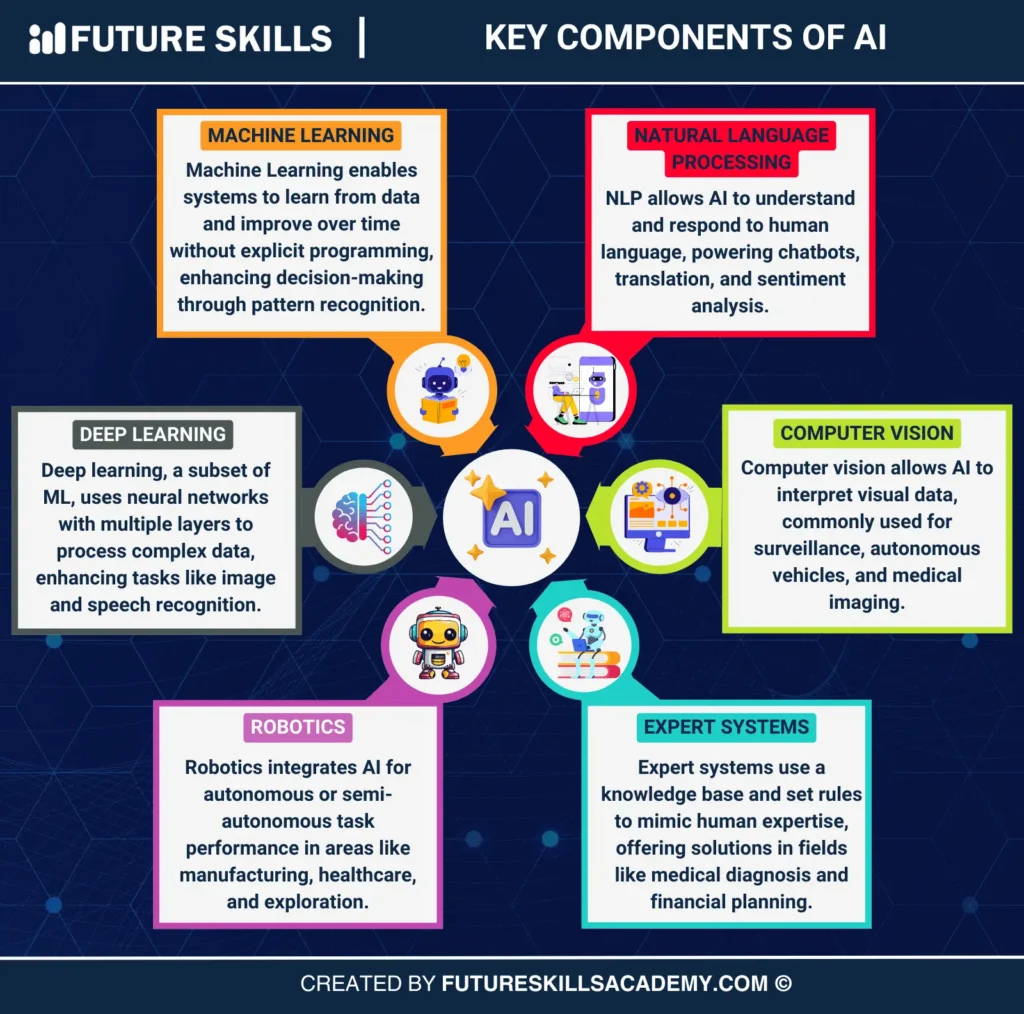
Business Benefits of AI Knowledge Bases
AI knowledge bases transform how businesses manage and utilize information by continuously analyzing user interactions to identify recurring issues and emerging trends.
This proactive approach helps organizations anticipate customer needs, improve decision-making, and optimize operational efficiency. By functioning as a dynamic repository, these systems evolve with user behavior, ensuring that information remains relevant and accessible.
Additionally, AI-driven insights enable predictive responses, enhancing customer support and reducing redundant queries.
- Proactive issue resolution – Identifies patterns in user interactions to address problems before they escalate.
- Real-time decision-making – Provides actionable insights to refine strategies and improve responsiveness.
- Efficient knowledge organization – Structures data intelligently for easy access and retrieval.
- Predictive capabilities – Anticipates user needs based on past interactions, improving response accuracy.
- Operational efficiency – Reduces redundant queries and enhances search relevance, streamlining workflows.
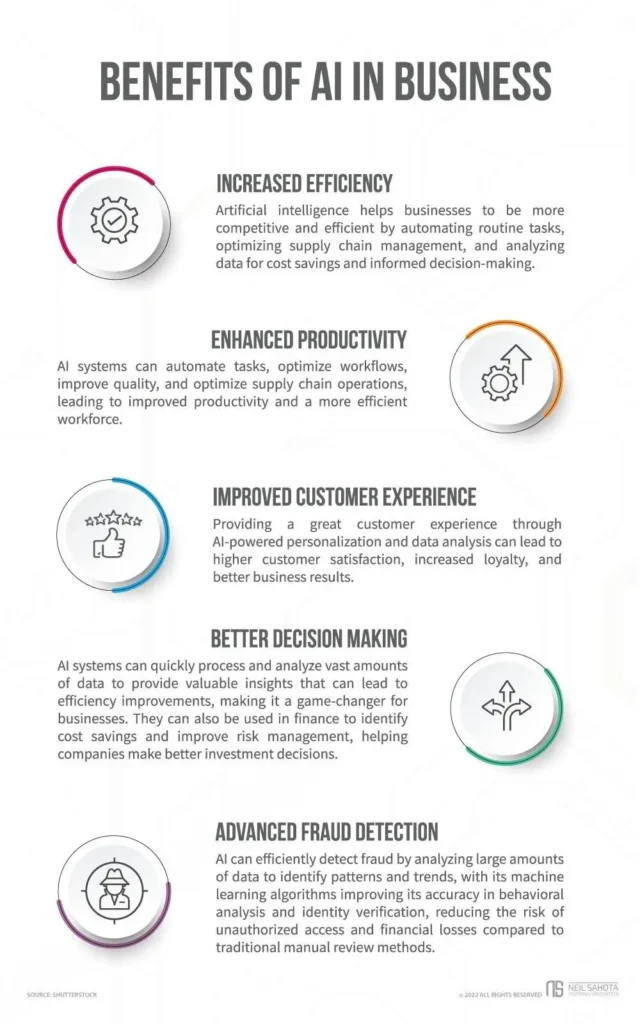
Comparing AI Knowledge Base Solutions
The key differentiator in AI knowledge bases is their adaptability to complex business needs. Advanced features like anti-hallucination technology enhance accuracy, improving customer trust.
CustomGPT.ai excels by supporting diverse file formats, multimedia content, and OCR-extracted data, ensuring a comprehensive, contextually relevant knowledge repository.
Unlike general AI platforms that struggle with fragmented data, CustomGPT.ai maintains high accuracy through dynamic indexing and intelligent data structuring.
General AI Knowledge Bases
General AI platforms provide broad functionality but often struggle with accuracy, data integration, and customization. While suitable for general inquiries, they lack the adaptability required for complex business environments.
- Limited Accuracy – Prone to misinformation due to the absence of anti-hallucination safeguards.
- Basic Data Processing – Struggles with diverse file formats like PDFs, OCR-extracted text, and multimedia.
- Fragmented Indexing – Standard methods result in inconsistent search results and lower retrieval accuracy.
- Minimal Customization – Built for broad applications with limited fine-tuning options for industry-specific needs.
- High Maintenance – Requires frequent human intervention to update content and maintain accuracy.
These platforms are fine for general queries, but if your business needs precise, customized knowledge management, they just won’t cut it.
CustomGPT.ai Knowledge Base
CustomGPT.ai is designed for high-accuracy, business-specific knowledge management, offering a refined, scalable, and adaptive AI solution that outperforms traditional AI knowledge bases.
- High Accuracy with Anti-Hallucination Technology – Integrates advanced safeguards to eliminate misinformation, ensuring responses are factually correct and contextually relevant.
- Advanced Data Processing & Multi-Format Support – Processes structured and unstructured data from multiple sources, including PDFs, Word documents, spreadsheets, OCR-extracted text, multimedia (audio, video), and proprietary business databases.
- Dynamic Indexing for Real-Time Adaptability – Continuously reorganizes and optimizes search relevance based on usage patterns, improving retrieval speed and accuracy.
- Industry-Specific Customization & Fine-Tuning – Allows businesses to train AI models on domain-specific terminology, proprietary knowledge, and unique datasets to provide context-aware, personalized responses.
- Seamless RAG API Integration with Enterprise Systems – Connects effortlessly with CRMs, help desks, customer support platforms, and internal knowledge repositories, ensuring a unified and accessible knowledge base across business applications.
- Self-Improving Efficiency & Automation – Uses machine learning and continuous feedback loops to refine responses, reduce human workload, and enhance operational efficiency over time.
- Scalability & Enterprise Readiness – Designed to handle large datasets, scale with business growth, and support high-volume queries while maintaining fast and accurate responses.
With CustomGPT.ai, you get a high-performing, ever-evolving AI knowledge base that actually understands your business.
| Feature | General AI Knowledge Base | CustomGPT.ai |
| Data Processing | Limited to structured data | Supports diverse formats including multimedia and OCR-extracted data |
| Contextual Accuracy | Prone to inconsistencies due to fragmented data sources | Maintains accuracy with dynamic indexing |
| Adaptability | Static knowledge retrieval | Continuously updated to reflect new data |
| Search Functionality | Basic keyword-based search | Advanced semantic search for contextual relevance |
| Trust and Reliability | Potential for misinformation | Anti-hallucination technology ensures verified responses |
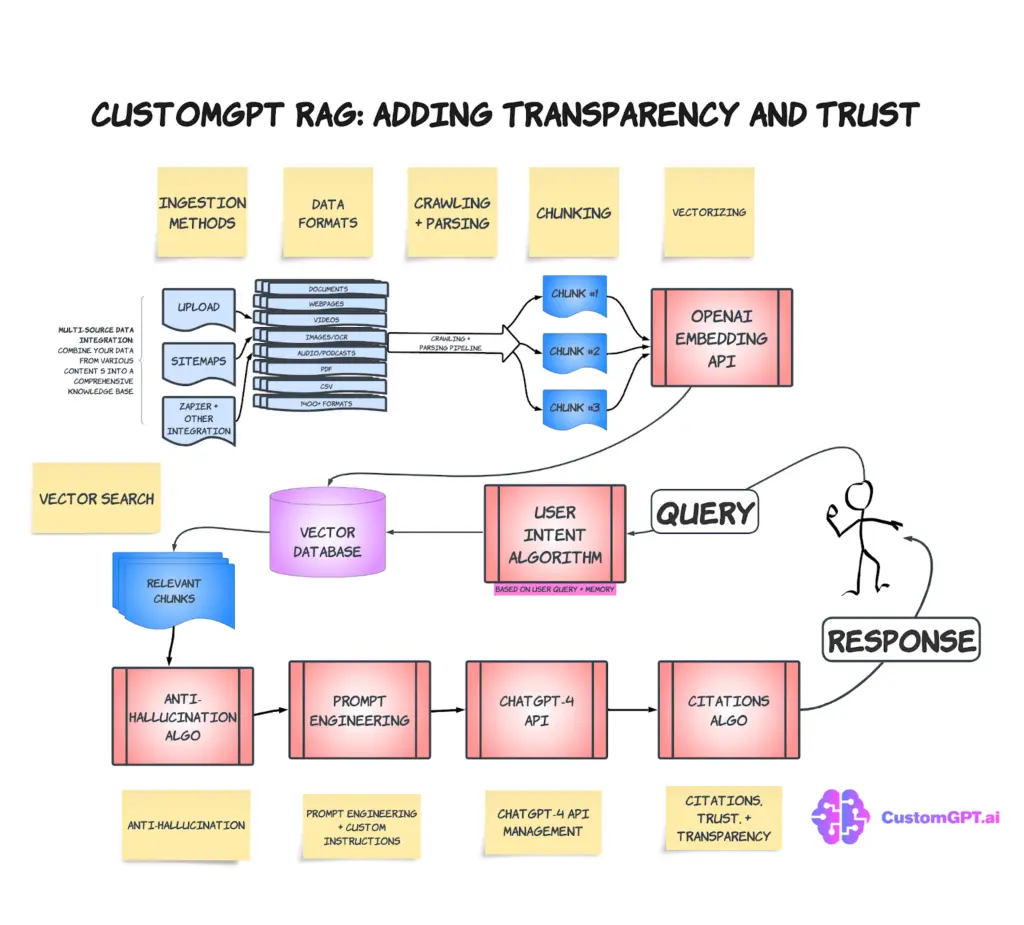
Introducing CustomGPT.ai
CustomGPT.ai excels in adaptive knowledge integration, a capability that ensures seamless handling of diverse data formats. This adaptability is powered by its real-time data ingestion pipelines, which process updates instantly, maintaining relevance even in fast-changing environments.
CustomGPT.ai employs dynamic vector-based search algorithms. These algorithms analyze semantic relationships within data, enabling precise responses to complex queries.
For instance, in a retail context, the platform can instantly adjust product recommendations based on inventory changes, ensuring users always receive accurate information.
A comparative analysis reveals that while many platforms struggle with latency when processing unstructured data, CustomGPT.ai maintains performance under high demand.
For businesses seeking a scalable, high-performance solution, CustomGPT.ai offers a transformative approach, turning fragmented knowledge into actionable insights with unparalleled accuracy.
Implementing a Custom AI Knowledge Base Using Customgpt.ai
Ready to make the switch? Here’s how to set up and optimize your AI knowledge base with CustomGPT.ai.
Step 1: Data Preparation & Structuring
Data must be gathered from multiple sources. Standardizing formats through data normalization removes redundancies and ensures consistency. Organizing information into relevant categories helps the AI understand context and improve retrieval accuracy.
Step 2: Training & AI Model Fine-Tuning
Once the data is structured, it must be uploaded into CustomGPT.ai for processing. Training the AI model with industry-specific terminology and historical queries ensures more precise responses.
Implementing anti-hallucination technology further enhances reliability by preventing misinformation.
Step 3: Integration & RAG API Deployment
CustomGPT.ai offers API-based integration for seamless connectivity with CRM systems, help desks, and internal knowledge repositories.
Automating responses reduces ticket resolution times and enhances operational efficiency. Dynamic indexing ensures real-time updates, improving search relevance and user experience.
Step 4: Testing & Optimization
Running test queries helps evaluate response accuracy and identify areas for improvement. Adjusting indexing parameters and retraining the model based on user feedback refines the knowledge base. Regular testing ensures the AI remains aligned with business needs and delivers consistent results.
Step 5: Deployment & Continuous Improvement
Once deployed, the AI knowledge base must be monitored for performance and user engagement. Usage analytics provide insights into response effectiveness, guiding refinements. Regular updates incorporating new data and business insights help maintain relevance and long-term efficiency.
By following these steps, businesses can leverage CustomGPT.ai to build a scalable, high-performing AI knowledge base that adapts to evolving demands.
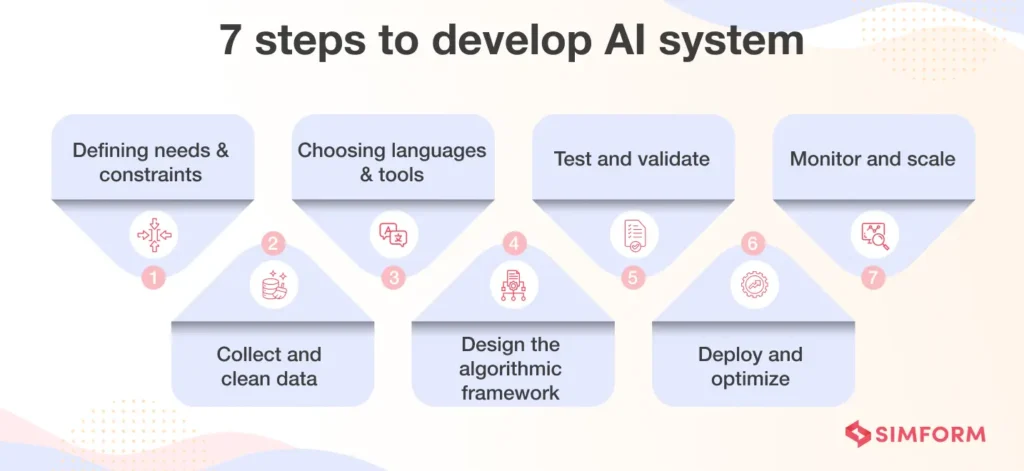
Advanced Features and Future Trends
Predictive analytics uses historical data to forecast user behavior and preemptively address challenges. Context-aware automation dynamically adapts responses based on real-time inputs.
CustomGPT.ai leverages anti-hallucination technology to ensure responses remain accurate and verified. Predictive analytics analyzes user interactions to anticipate needs, while real-time data modeling refines predictions by integrating new user behaviors.
Overfitting models to individual behaviors can reduce scalability. Platforms like CustomGPT.ai use multi-layered predictive frameworks to balance personalization depth with adaptability.
Incremental model updates ensure AI systems remain relevant without retraining from scratch. Unlike batch training, streaming data pipelines allow real-time processing of new inputs. Techniques like replay buffers prevent AI from forgetting critical prior knowledge.
Build a Smarter Knowledge Base
Optimize workflows, enhance collaboration, and scale effortlessly.

FAQ
What are the key components of a custom AI knowledge base and how do they interact?
The core components include a centralized data repository, NLP for understanding queries, ML for continuous improvement, and advanced search capabilities. These elements interact to ensure efficient knowledge retrieval and adaptation to evolving business needs.
How does a custom AI knowledge base leverage NLP and ML?
NLP interprets user intent, while ML refines responses based on behavioral patterns. Together, they create a dynamic system that improves personalization and query accuracy over time.
What best practices optimize search relevance in AI knowledge bases?
Structuring data with clear categories, tagging systems, and metadata annotations enhances search precision. Regular audits ensure data remains accurate and relevant.
How can businesses integrate a custom AI knowledge base with existing tools?
APIs and middleware unify systems, ensuring consistent data flow. Metadata tagging improves search relevance, while real-time synchronization enhances operational efficiency.
What are the benefits of implementing a custom AI knowledge base?
AI knowledge bases reduce costs, improve decision-making, and enhance efficiency. Industries like healthcare benefit from improved diagnostics, while retail sees enhanced personalization and faster customer query resolution.
Conclusion
AI knowledge bases have revolutionized the way businesses manage, retrieve, and utilize information. By leveraging NLP, machine learning, and dynamic indexing, these systems provide context-aware, predictive, and highly relevant insights.
Their ability to adapt to user needs, streamline operations, and enhance customer experiences makes them indispensable tools across industries.
As AI continues to evolve, businesses that integrate AI knowledge bases will gain a competitive edge through improved efficiency, accuracy, and decision-making.
The future of AI-driven knowledge management will be shaped by advancements in automation, personalization, and real-time data processing, ensuring that organizations stay ahead in an increasingly data-driven world.
Businesses that invest in AI-driven knowledge management today will be leading their industries tomorrow.
Explore how CustomGPT.ai can help your business build a powerful, AI-driven knowledge base chatbot for smarter knowledge management.
Build your own custom AI knowledge base in minutes.
Deliver exceptional customer experiences and maximize employee efficiency with an custom AI knowledge base.
Trusted by thousands of organizations worldwide



